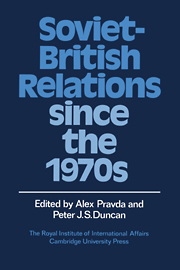Book contents
- Frontmatter
- Contents
- Contributors
- Acknowledgments
- 1 Introduction: pre-perestroika patterns
- 2 The historical perspective
- 3 Soviet perspectives on Britain and British foreign policy
- 4 British perspectives on the Soviet Union
- 5 The security dimension
- 6 Anglo-Soviet relations: political and diplomatic
- 7 The Soviet Union and the Left in Britain
- 8 Anglo-Soviet cultural contacts since 1975
- 9 Trade relations: patterns and prospects
- 10 Doing business with the USSR
- 11 Conclusions: Soviet-British relations under perestroika
- Index
7 - The Soviet Union and the Left in Britain
Published online by Cambridge University Press: 29 October 2009
- Frontmatter
- Contents
- Contributors
- Acknowledgments
- 1 Introduction: pre-perestroika patterns
- 2 The historical perspective
- 3 Soviet perspectives on Britain and British foreign policy
- 4 British perspectives on the Soviet Union
- 5 The security dimension
- 6 Anglo-Soviet relations: political and diplomatic
- 7 The Soviet Union and the Left in Britain
- 8 Anglo-Soviet cultural contacts since 1975
- 9 Trade relations: patterns and prospects
- 10 Doing business with the USSR
- 11 Conclusions: Soviet-British relations under perestroika
- Index
Summary
In this chapter we first examine Soviet perceptions of the ‘Left’ in Britain, for an assessment of Soviet views will provide us with a clearer understanding of what motivates Soviet policy in relation to such important groups as the Labour Party, the trade unions or the peace movement. The second part of the chapter assesses, in the light of Soviet perceptions, interactions between the Soviet Union and these major components of the British Left during the 1980s.
The sources that are available are ultimately all under the control of the CPSU and are heavily censored, which severely limits the freedom of individuals to express their views openly and candidly. Yet these limitations are also in a way advantageous, for until very recently what is permitted to be published is likely to reflect the dominant views of the political elite at any particular time. Furthermore, if there does exist any polarisation of views among the political elite this too may be identified in the opposing positions among the academic community. Published views though, given the nature of the Soviet political system, often contradict what proponents of these views say in private conversation. In order to compensate for this problem, and to complement our analysis, we interviewed a number of representatives of the Left who have direct dealings with Soviet officials. Under the broad term ‘the Left’ we have decided to focus on four groups: the Labour Party, trade unions, the Communist Party of Great Britain (CPGB), and the peace movement. Some readers will take issue with us for leaving out other groups. But our choice was made on the basis of the importance these groups have in Soviet perceptions of the Left in Britain, which is our subject.
- Type
- Chapter
- Information
- Soviet-British Relations since the 1970s , pp. 147 - 167Publisher: Cambridge University PressPrint publication year: 1990
- 1
- Cited by



